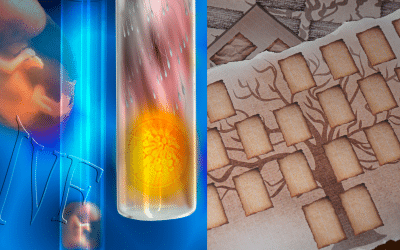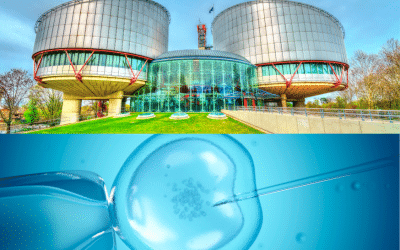On April 18, 2018, Alliance VITA held a presentation and dedication ceremony in honor of their Director of Training and Research, Blanche Streb, for her new book entitled: “Customised Babies – Survival of the Fittest”1 (published by ARTEGE editions).
Interview
What motivated you to write this book?
Because not only in France, but elsewhere, we are in a state of ethical crisis. The government is suggesting that surrogacy without father may be authorized. Even the fact of speaking of such a drastic permutation show that we are on the verge of a commonly accepted right to have a child. For any situation whatsoever, even in case unrelated to infertility. The right to have a child is the first step towards ordering babies from an “à la cart” menu. We must be on the alert when we see how the reproductive marketplace and pre-selection process is already expanding in other countries: the US, Belgium, Spain, Cyprus, Ukraine etc. Is this really what we want for our country…to have the right to place an order for a child?
Debates concerning surrogacy without a father have clearly shown that French people disapprove it. Society is “not ready”. Fortunately, the priority still prevails in favor of the best interest of the child.
« Customised » babies?
This is a baby that can be conceived in both the figurative and literal definitions of the term. Firstly as a “project” designed with certain parameters, then tangibly with artificial fertilization in a test tube.
Why the survival of the fittest?
The customized baby earns a right to exist by meeting certain criteria. For example, by not having any known genetic disease or even not being predisposed to a disease (even though testing doesn’t ensure that the baby will not ultimately be affected); – or by corresponding to the chosen aesthetic criteria: size, eye color, sex …; – or by being genetically boosted to be “better” than the others… Hence this subtitle: the survival of the fittest is a world where human existence yields to technology, where human beings, besides being selected to obtain the right to existence, would then be improved, or even “enhanced”.
What’s wrong with wanting to improve the quality of human beings?
It is a viewpoint on the slippery slope towards eugenics. And the techniques ignore any precautionary principles, making the embryo an object, a guinea pig. Most of the methods are neither safe nor effective. None of this can eliminate suffering from our lives nor make humans any better. It cannot guarantee happiness for either the customised babies or their designers, and it doesn’t contribute to build a fairer or more hospitable civilization…. To be born after the sorting process or genetic manipulation could make those individuals feel as if they exist only “thanks to the technological goodwill” of someone else. A bit like a probationary period throughout their entire lives. Am I good enough, perfect enough? Do I sufficiently meet the specifications that I was designed for? Then why am I not completely, totally, and permanently happy if that’s what I was conceived for? To whom can I complain? And for what? Doesn’t refusing to accept an anomaly, a weakness, entail the risk of nipping happiness in the bud?
What is the objective of your book?
It’s an overall summary on the topic and how we reached this point. What are the techniques used today for selecting and creating babies “à la carte”? How far can technology go: artificial gametes, babies created from 2 people of the same sex, 3-parent IVF? I also discuss the impact for these means of conception on the child, on the parents, on human relationships, on society… Finally, I propose some keys to help encouraging a burst of conscience: rediscover human biodiversity, refuse the genetic bar code, reflect on the ethics of donating, and define the progress for serving mankind… I think it is time to rethink the whole process of artificial reproduction and set boundaries that we can all agree upon. We must step back from our fascination with technology. What biotechnology allows today for surrogacy cannot promise what we all hope for: a better world! One must always ask oneself: does this technical progress really lead to progress for mankind?
_______________________________________________________
Bébés sur mesure – le monde des meilleurs, Blanche Streb, Artège éditions, 2018.
This book is available in French at your regular bookstore or by order.



